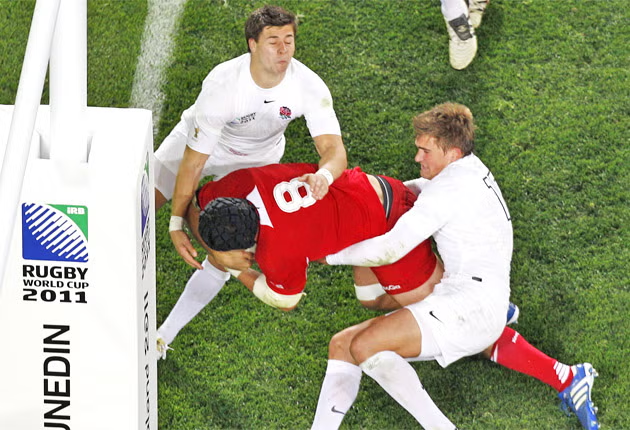Where did all the minnows go? How the World Cup came of age

There is a little sanity running through the England camp all of a sudden, in contrast to the lunacies of Queenstown week, which fed directly into the poor performance against Georgia four days ago.
And Jonny Wilkinson – famously accused of being a "basket case" during the 2003 tournament in Australia – made a good deal of sense during the team meeting called on Monday.
The great goal-kicker (right) said: "I know that if you don't get it right, sooner or later 'next week' doesn't happen for you. World Cup rugby is do or die and it's been that way for me right from the start. That's why we must keep making the most of every second we have to train and prepare.
"To me, it's about being accountable. What happened against Georgia could have cost us very badly, because we gave them the chance to score 20-odd points through penalties. Who knows what will happen next time we do that? It could leave us in a place where we can't get back."
This is Wilkinson's fourth World Cup, and he had his share of trauma in each of his three previous visits to the tournament. Controversially dropped by Clive Woodward before the 1999 quarter-final against the Springboks – "Jonny was in the side when I went to bed the night before the game and out of it when I woke up," recalled Brian Ashton, the England attack coach at that time – he played poorly against both Samoa and Wales in 2003 before coming up trumps on final night in Sydney.
Four years ago, injury spared him first-hand experience of the chastening 36-0 pool-stage defeat at the hands of the South Africans, but he quickly became part of a solution that took England to a second successive final. "That South Africa match flagged up a path we had to go down, and thank God we did," he recalled. "I don't think we're searching for answers in the same way now, but there is an understanding that we can't keep making the same errors. We gave away penalties against Argentina and gave them away again against Georgia. Once is a mistake, twice is more than that. Three times? It just can't happen."
After the Georgia match, a number of players – the scrum-half Ben Youngs and the No 8 James Haskell included – were heavily critical of their colleagues' indiscipline. This led to reports of a split in the ranks. According to both Wilkinson and hooker Steve Thompson, nothing could be further from the truth.
"Our team meeting was just a team meeting," Wilkinson insisted. "It was no different to the kind of review we would usually conduct after a match. The freshest meetings are the ones after a game."
Thompson put it a little more colourfully: "Stabbing in the belly is always better than stabbing in the back."
Join our commenting forum
Join thought-provoking conversations, follow other Independent readers and see their replies
Comments
Bookmark popover
Removed from bookmarks